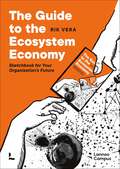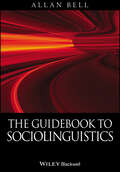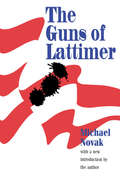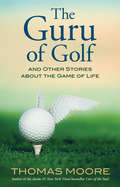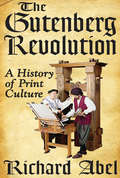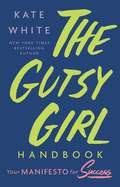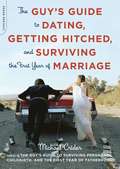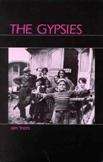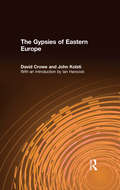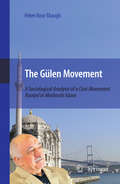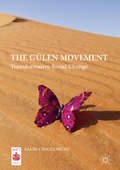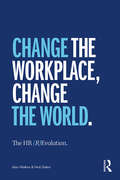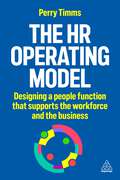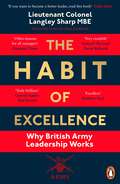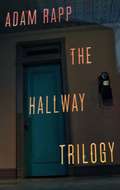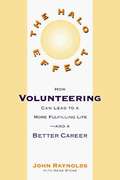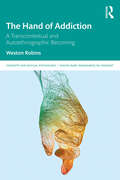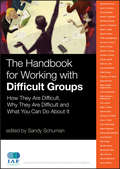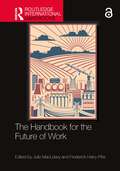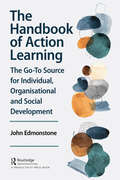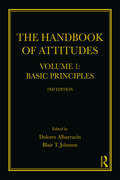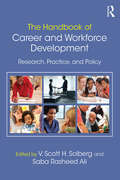- Table View
- List View
The Guide to the Ecosystem Economy: Sketchbook for Your Organization's Future
by Rik VeraThis is the era of the Smart Ecosystems Economy, where the companies that thrive must be ready to cope with randomness and unexpected events. In this digital world, the traditional boundaries have disappeared, paving the way for new and smarter ecosystems to develop. Companies seeking to transform into future-proof organizations would do well to understand these ecosystems, and get a grasp on how they work. This book serves as a guide to building smart, competitive ecosystems for both small and large organizations. A timely book that cracks the code of tomorrow&’s business models.
The Guidebook to Sociolinguistics (Introducing Linguistics Ser.)
by Allan BellThe Guidebook to Sociolinguistics presents a comprehensive introduction to the main concepts and terms of sociolinguistics, and of the goals, methods, and findings of sociolinguistic research. Introduces readers to the methodology and skills of doing hands-on research in this field Features chapter-by-chapter classic and contemporary case studies, exercises, and examples to enhance comprehension Offers wide-ranging coverage of topics across sociolinguistics. It begins with multilingualism, and moves on through language choice and variation to style and identity Takes students through the challenges involved in conducting their own research project Written by one of the leading figures in sociolinguistics
The Guns of Lattimer
by Michael NovakOn September 10, 1897, in the hamlet of Lattimer mines, Pennsylvania, an armed posse took aim and fired into a crowd of oncoming mine workers, who were marching in their corner of the coal-mining region to call their fellow miners out on strike. The marchers Poles, Slovaks, Hungarians, most of whom could not yet speak English were themselves armed only with an American flag and a timid, budding confidence in their new found rights as free men in their newly adopted country. The mine operators took another view of these rights and of the strange, alien men who claimed them. When the posse was done firing, nineteen of the demonstrators were dead and thirty-nine were seriously wounded. Some six months later a jury of their peers was to exonerate the deputies of any wrong-doing.This long-forgotten incident is here movingly retold by Michael Novak, himself the son of Slovak immigrants and one of our most gifted writers and social observers. In his hands, the so-called "Lattimer Massacre" becomes not only a powerful story in its own right (and an invaluable key to the history of the growth of the united mine Workers), but an allegory of that peculiarly American experience undergone over and over again throughout the land, and down to this very day; the experience of new immigrants, still miserable with poverty and bewilderment and suffering the trauma of culture shock, being confronted by the hostility and blind contempt of the "real" Americans.In Michael Novak's uniquely vivid account, the incident at Lattimer is seen as a tragedy brought on not so much by inhumanity as by the profound failure of majority WASP society to understand the needs and responses of "foreigners." The Guns of Lattimer is a gripping book that tells Americans, old and new, a great deal about themselves and the society they live in.
The Guru of Golf: And Other Stories About The Game Of Life
by Thomas MooreWhile to some chasing a small white ball across a vast field of grass may seem pointless, the game of golf has, for centuries, drawn everyone from the poor working class to the upper crust of society. There is something enchanting about the experience of golf that sets it apart from other sports. In this collection of 18 short stories, The Guru of Golf celebrates perhaps one of the most widely popular of athletic pursuits. Thomas Moore shows us how golf can be a perfect metaphor for life itself-endlessly mysterious, joyful, and captivating, yet at times unbearable. From the tee to the green, he intertwines modern and classical tales that illustrate the challenges players face-on and off the course. A game rife with strict rules on etiquette and both physically and mentally taxing, golf tests the body, mind, and spirit. Humorous and insightful, The Guru of Golf captures the range of emotions associated with its players' ardent determination; searches for meaning behind quiet, solitary moments; and reveals the struggles that try our patience, as well as the victories that make the game-and life-worthwhile.
The Gutenberg Revolution: A History of Print Culture
by Richard AbelOne of the most puzzling lapses in accounts of the rise of the West following the decline of the Roman Empire is the casual way historians have dealt with Gutenberg's invention of printing. The cultural achievements that followed the fifteenth century, when the West moved from relative backwardness to remarkable, robust cultural achievement, would have been impossible without Gutenberg's gift and its subsequent widespread adoption across most of the world.Richard Abel follows the radical cultural impact of the printing revolution from the eighth century to the Renaissance, addressing the viability of the new Christian/Classical culture. Although this culture proved too fragile to endure, those who salvaged it managed to preserve elements of the Classical substance together with the Bible and all the writings of the Church Fathers. The cultural upsurge of the Renaissance (fourteenth to seventeenth centuries), which resulted in part from Gutenberg's invention, is a major focus of this book.Abel aims to delineate how the cultural revolution was shaped by the invention of printing. He evaluates its impact on the rapid reorientation and acceleration of the cultural evolution in the West. This book provides insight into the history of the printed word, the roots of modern-day mass book production, and the promise of the electronic revolution. It is an essential work in the history of ideas.
The Gutsy Girl Handbook: Your Manifesto for Success
by Kate WhiteBestselling author, professional speaker, and former editor-in-chief of Cosmopolitan, Kate White shares the nine core principles gutsy women need to go bigger, bolder, and achieve the full level of success they desire.Twenty-two years ago Kate White wrote the bestselling career bible Why Good Girls Don't Get Ahead but Gutsy Girls Do, and helped thousands of women push their success to the next level. Now a new generation of women, still eyeing the pay gap and glass ceiling, needs its own set of rules for today's modern workplace.In THE GUTSY GIRL HANDBOOK White presents the nine core principles that have guided her career, offering dozens of straightforward, doable strategies for women in any field and at any stage in their professional lives. Drawing on original research, and sharing new success stories and never-before told examples from her time as the editor-in-chief of Cosmo, White inspires women to own their excellence, break the rules (or make their own), ask for the money and opportunities they deserve, and refuse to apologize for who they are and what they want. THE GUTSY GIRL HANDBOOK is a resource for women who want to build confidence, negotiate a great salary and perks, manage meetings, mansplaining, and interruptions, and create game-changing "notice me" ideas. This all-new, accessible handbook is a great gift for graduates, and a must-read for professional women of all levels.
The Guy's Guide to Dating, Getting Hitched, and Surviving the First Year of Marriage
by Michael CriderFrom the moment he sees his future wife across a smoke-filled college keg party, Michael Crider has a strong hunch that his single days are numbered. In between that moment of early understanding and his sweaty presence years later at the altar, however, Crider missteps, stalls, and resists like a true man's man. Remembering his evolution from swinging singleto linked for life, Crider chronicles the highs and lows of relationship progress: from the nauseating dating days of "No, I love you more!" to his own embarrassing version of "Meet the Parents"; from plotting his marriage proposal to the wedding and reception itself (a.k.a. "booze, the bride, and blue balls"). For men under pressure to propose or newly affianced, newlywed or veteran to the husband hustle, Michael Crider's flawed attempts at both grand romantic gestures and small attempts to control his fate will be all too familiar. Refreshingly honest and laugh-out-loud funny,The Slow and Inevitable Crawl Toward Happily Ever After should also appeal to the long-suffering women in their lives who, for better or worse, recognize their men in its pages.
The Guy's Guide to Dating, Getting Hitched, and Surviving the First Year of Marriage
by Michael R. CriderFrom the moment he sees his future wife across a smoke-filled college keg party, Michael Crider has a strong hunch that his single days are numbered. In between that moment of early understanding and his sweaty presence years later at the altar, however, Crider missteps, stalls, and resists like a true man's man. Remembering his evolution from swinging singleto linked for life, Crider chronicles the highs and lows of relationship progress: from the nauseating dating days of "No, I love you more!" to his own embarrassing version of "Meet the Parents"; from plotting his marriage proposal to the wedding and reception itself (a.k.a. "booze, the bride, and blue balls"). For men under pressure to propose or newly affianced, newlywed or veteran to the husband hustle, Michael Crider's flawed attempts at both grand romantic gestures and small attempts to control his fate will be all too familiar. Refreshingly honest and laugh-out-loud funny,The Slow and Inevitable Crawl Toward Happily Ever After should also appeal to the long-suffering women in their lives who, for better or worse, recognize their men in its pages.
The Gypsies
by Jan Yoors"This book is written as a protest against oblivion, as a cry of love for this race of strangers who have lived among us for centuries and remained apart. Thus it is of the nomads that I sing." (Jan Yoors, from the Introduction) At the age of twelve, Jan Yoors ran away from his privileged Belgian family and home to join a wandering band, a kumpania, of Gypsies. For ten years, he lived as one of them, traveled with them from country to country, shared both their pleasures and their hardships and came to know them as no one, no outsider, ever has. In this firsthand, highly personal account of an extraordinary people, Yoors tells the real story of the Gypsies' customs and their never-ending struggle to survive as free nomads. In a rare publishing event, Jan Yoors' The Gypsies became an instant classic upon its original publication. Yoors vividly describes the texture of daily life: Gypsies as lovers, spouses, parents, healers, and mourners; loyalties and hostilities; moral and ethical beliefs and practices; language and culture; and history and traditions behind their fierce pride. The exultant celebrations, daring frontier crossings, yearly horse fairs, and convoluted business deals are brought to life in this memorable portrait of the most romanticized yet most maligned and least-known people on earth. As one reviewer wrote, "The Gypsies conveys an understanding of Other that transcends stereotypes and analytical flatness.
The Gypsies of Eastern Europe
by David Crowe John Kolsti Ian HancockIn recent news coverage of the dramatic political events in Eastern Europe, Gypsies have been a favourite sidebar topic. Some of the stories have been truly horrifying, others are written condescendingly and to amuse; but what has become clear is how little we really know about this people. In a concerted effort to uncover the modern history of the Rom in Eastern Europe, the authors examine the Gypsy experience in Albania, Czechoslovakia, Hungary, Romania and Yugoslavia, with special attention to the Nazi Holocaust as well as to the record of the forced settlement and education programmes instituted by communist regimes.
The Gülen Movement
by Helen Rose EbaughThis is a book about an Islamic movement, the Gülen Movement, that is rooted in a moderate version of Islam and that promotes interfaith and intercultural dialog and global peace. Based on interviews with supporters of the movement in Turkey and in the U.S. and visits to Gülen-inspired schools, hospitals, newspapers and relief organizations, the book describes a movement that has millions of supporters in Turkey and that has spread to over 100 countries on five continents.
The Gülen Movement: Transformative Social Change (Middle East Today)
by Salih CıngıllıoğluThis book presents findings from research into one of the world's most influential Islamic movements, the Gülen Movement, from the perspective of social transformation through adult education. At the core of research questions lies how the movement enrolls volunteers from all walks of life and transforms them to adopt its aims at the expense of their individual ideals. The book reveals the socio-psychological mechanisms that make such transformation possible by looking at how followers integrate weekly lectures and discussions on the theory and practice of Islam into their personal and social lives. The Gülen Movement offers a moderate interpretation of Islam and stresses the vitality of establishing communication with the members of all faiths. This book provides a window into how and why religion may roll into extremism by presenting findings from an opposite perspective: the participants in the research all define themselves as truly pious but do not even imply an act of violence in tens of hours of interviews. In short, the book weaves the strands of "Islamic," "movement," and "adult education" into a unified whole and limns the snapshot of a social movement, offering a comprehensive discussion of the role of adult education within the movement, as well as its transformative potential and its wider social and political implications.
The HR (R)Evolution: Change the Workplace, Change the World
by Alan Watkins Nick DaltonMany observers have suggested that capitalism is fast destroying our planet, concentrating power in a few big companies. Excessive short-termism, leveraged debt, digitisation, and disruption are the new normal. We stand at a critical juncture where the two paths ahead could lead to very different futures. One route could take us back to the harshest days of the early Industrial Revolution and the Great Depression. The other could lead to a world of abundance, equality, inclusivity, and prosperity for all. Which future awaits us will largely be determined by business, and HR (Human Resources) in particular. Books on HR tend to focus on HR practices and potential interventions, but they rarely look at the profession, how it evolved, and how and why those people practices were created. The HR (R)Evolution: Change the Workplace, Change the World describes the "Seven Great Waves" of change and explains how each wave impacted business. It explains how some companies are stuck in the past and how HR can break the deadlock if it understands what the future holds. This book is meant for senior business leaders or anyone currently working in HR who are grappling with the paradoxes of business today. It’s for leaders who recognise that people issues are the central challenge of our time. Whether we embrace the waves yet to come will determine whether we survive or regress, whether we flourish or flounder. The future is in our hands.
The HR Operating Model: Designing a People Function that Supports the Workforce and the Business
by Perry TimmsThe traditional Ulrich HR operating model is no longer fit for purpose but what needs to change? How do people professionals build a high-impact HR department that adds business value? This book has the answer. The HR Operating Model outlines the traditional approaches to designing HR structures, practices and process and explains why these are no longer appropriate in today's business environment. This book then provides a new HR operating model which can be used to ensure that the HR function develops and supports a high-performing workforce and aligns with the organization's strategic objectives. Showcasing the four core elements of people experience, data and analytics, agility and product management and technology integration, this book provides everything that senior people professionals need to build a successful people department that adds measurable business value. Including real-world examples from Santander, Jaguar Land Rover, Barnardo's, Collinson Group, Novartis and Natwest, this book shows how organizations are benefitting from this approach to their HR operating model. The book is full of practical advice, tips, tools and frameworks as well as interviews from experts in the people profession which allow all senior HR professionals from public or private sector companies of any size to benefit from this approach too. Written by a leading voice in the industry who has been recognized five times as one of the Most Influential HR Thinkers by HR Magazine, this book is essential reading for people professionals who want to add business value and align HR activity with the organization's strategic objectives.
The Habit of Excellence: Why British Army Leadership Works
by Lt Col Langley SharpThe official British Army book on what makes its leadership so successful, and how to become a better leader yourself - whatever your field. ___________________'If you want to become a better leader, read this book' Eddie Jones'An extraordinary read for any leader. Truly brilliant' General Stanley McChrystal, author of Team of Teams'Excellent. Offers proven tools and strategies' Matthew Syed___________________ The Habit of Excellence is a unique insight into British Army leadership, explaining what makes it unique, what makes it so effective and what civilians can take from it to become better leaders themselves. Drawing on the latest research in military history, business, sociology, psychology and behavioural science, and with compelling illustration from British Army operations across the centuries, Lt Col Langley Sharp MBE goes beyond the latest leadership fads to distil into one peerlessly authoritative work the essence of leading and leadership from one of the world's most revered institutions.___________________'Excellent. It's hard to see how any leader, whatever their field, wouldn't benefit from reading and rereading it' New Statesman 'Offers lessons for all managers' Financial Times 'Valuable in any walk of life' General Sir Mike Jackson, former Chief of the General Staff 'Very readable. I could not recommend this exceptional book more' General The Lord David Richards, former Chief of the Defence Staff 'Comprehensive and clearly written' Karin von Hippel, Director-General of RUSI 'Terrific. Full of insights and lessons' General David Petraeus, former Director of the CIA
The Habitable City in China
by Toby Lincoln Xu TaoThis book offers a new perspective on Chinese urban history by exploring cities as habitable spaces. China, the world's most populous nation, is now its newest urban society, and the pace of this unprecedented historical transformation has increased in recent decades. The contributors to this book conceptualise cities as first providing the necessities of life, and then becoming places in which the quality of life can be improved. They focus on how cities have been made secure during times of instability, how their inhabitants have consumed everything from the simplest of foods to the most expensive luxuries, and how they have been planned as ideal spaces. Drawing examples from across the country, this book offers comparisons between different cities, highlights continuities across time and space--and in doing so may provide solutions to some of the problems that continue to affect Chinese cities today.
The Hadza: Hunter-Gatherers of Tanzania
by Frank W. MarloweThe Hadza, who inhabit an area of East Africa near the Serengeti and Olduvai Gorge, have long drawn the attention of anthropologists and archaeologists for maintaining a foraging lifestyle in a region that is key to understanding human origins.
The Hallway Trilogy
by Adam Rapp"Rapp remains a true man of the theater and a potent writer."--Time Out "To watch The Hallway Trilogy by Adam Rapp is to enter an alternate universe . . . a carnival of the desperate, the grotesque, the outrageous."--The New York Times "I knew in a single sentence that Adam was a writer the world was going to listen to for as long as he felt like writing. . . . Adam writes like nobody else, his fierce poetic power as inescapable as the doom that waits for his characters. The work is bleak and true, his touch that of a master in the making."--Marsha Norman Multi-talented artist and provocateur Adam Rapp shocks and disturbs, weaving themes of love, suffering, and redemption throughout this alarming yet heartening critical examination of societal change. Spanning one hundred years in one Lower East Side tenement hallway, this series of connected plays--Rose, Paraffin, and Nursing--is a dark and compelling exploration of what binds people together and drives them apart. Packed with searing dialogue and harrowing narratives, The Hallway Trilogy "bristles with humor" and "contains some of Rapp's most sensitive and mature writing" (The New York Times). Adam Rapp is a novelist, filmmaker, and an OBIE Award-winning playwright and director. His plays include the Pulitzer Prize finalist Red Light Winter, Nocturne, Stone Cold Dead Serious, Finer Noble Gases, Essential Self-Defense, and more. He is the author of many young adult novels such as Punkzilla, The Buffalo Tree, and Under the Dog, and the writer and director of the film Winter Passing, starring Zooey Deschanel, Will Ferrell, and Ed Harris.
The Halo Effect: How Volunteering Can Lead to a More Fulfilling Life-And a Better Career
by John Raynolds Gene StoneA "business book with a heart," <i>The Halo Effect</i> illustrates how inspiration in careers and in lives can be renewed by service to others. Volunteer work can help you learn new skills, meet new people, and develop a whole new perspective on your goals. A complete resource that outlines everything you need to know about volunteer work, <i>The Halo Effect</i> includes an appendix that lists and describes the best volunteer organizations that need your help today.
The Hand of Addiction: A Transcontextual and Autoethnographic Becoming (ISSN)
by Weston RobinsThe Hand of Addiction maps out addiction from an innovative and holistic perspective, challenging the pervasive discourses surrounding addiction in many fields. Using the metaphor of a hand, the author examines addiction through five conceptual lenses—biomedical, psychological, sociocultural, developmental, and spiritual.The book successfully integrates Gregory Bateson’s understanding of the human hand, and further extends it to the study of addiction, studying the relationships between the different fingers (lenses) to reveal how the study of addiction so far has been myopic and compartmentalized. Using an autoethnographic approach, the author constructs a transcontextual mapping of the potential of addiction, and challenges what we claim to know about addiction, aiming to understand addiction from a novel perspective. The book also discusses practical strategies that can be used to support those with addiction in various forms.An important contribution to the literature on addiction studies, this book will be of great interest to academics and postgraduate students in the fields of psychology, sociology, cultural studies and other related disciplines. It will also be relevant for those interested in the philosophy and ethnography of addiction or those working in mental health.
The Handbook for Working with Difficult Groups
by Sandy SchumanPraise for The Handbook for Working with Difficult Groups"Beginning with a conceptual framework useful to understand effective group functioning, The Handbook for Working with Difficult Groups continues with twenty chapters, each describing a common challenge a facilitator can face, examining the research available to understand the difficulty, and then offering pragmatic interventions a facilitator can use to deal with this challenge. A must-read for any group facilitator."-David Straus, founder, Interaction Associates"If you're looking for ways to make your team more productive, you'll find golden nuggets written just for your situation in The Handbook for Working With Difficult Groups. A compendium of research and sage advice, this book offers experienced insights into how to transform seemingly dysfunctional groups and avoid obstacles before you hit them. Should be in the library of any leader or facilitator!"-Tammy Adams, CPF, president, Chaosity LLC"This fine book contains a rich diversity of case studies, approaches and wise counsel from leading practitioners working with groups. It will help you to understand and facilitate effectively in even the most difficult situations."-Dale Hunter, author, The Art of Facilitation: The Essentials for LeadingGreat Meetings and Creating Group Synergy"Whether you are a facilitator, leader, or member of a group, you will gain surprising insights into why a group is difficult, and more importantly, how to recognize the cause of the difficulty and how to develop an effective response to move the group forward."-Gary Rush, CPF, president, MGR Consulting; chair, International Association of Facilitators (IAF)
The Handbook for the Future of Work (Routledge International Handbooks)
by Frederick Harry Pitts Julie MacLeavyThe Handbook for the Future of Work offers a timely and critical analysis of the transformative forces shaping work and employment in the twenty-first century.Focusing on the past two decades, the handbook explores how technological advancements, automation and a shifting capitalist landscape have fundamentally reshaped work practices and labour relations. Beyond simply outlining the challenges and opportunities of automation, the handbook integrates these emerging realities with established discussions of work. Importantly, it moves beyond dominant technology-centric narratives, probing into broader questions about the nature of capitalism in a time of crisis and the contestation for alternative economic models. With contributions from established and emerging authors, based in institutions around the world, the handbook offers a systematic overview of the developments that have sparked radical shifts in how we live and work, and their multifaceted impacts upon social relations and identities, practices and sectors, politics and environments.The handbook is unique in its exploration of the potential for economic transformations to reshape the centrality of work in our social and political imaginaries. A useful resource for students and researchers, the handbook serves as an essential guide to this new intellectual landscape.
The Handbook of Action Learning: The Go-To Source for Individual, Organizational and Social Development
by John EdmonstoneAction learning is one of the most prominent individual and organisational development approaches used in all parts of the world, including in over 70 member states of the United Nations. From its early beginnings in the 1970s, it has been adopted in private, public and third-sector organisations and has produced several variations. Used for leadership and management development, to support teamwork and problem-solving, and to encourage creative thinking, it can help to develop and enhance the learning capacity for individuals and organisations.Applied as a discrete activity focused on a priority need or on new or changed roles; as a linkage between more formal programs and the workplace or blended with other elements in a program, this book distils current and previous practice and theory to provide an up-to-date guide to action learning. The book will provide readers with an understanding of action learning, including the major elements, the choice of issues, the key skills, the role of the facilitator and applications organisation-wide. It will address such important aspects as how action learning can adapt to different national and regional cultures and how it can be evaluated. It will also offer a range of resources for further and deeper understanding.
The Handbook of Attitudes, Volume 1: 2nd Edition
by Dolores Albarracin Blair T. JohnsonAttitudes are evaluations of people, places, things, and ideas. They help us to navigate through a complex world. They provide guidance for decisions about which products to buy, how to travel to work, or where to go on vacation. They color our perceptions of others. Carefully crafted interventions can change attitudes and behavior. Yet, attitudes, beliefs, and behavior are often formed and changed in casual social exchanges. The mere perception that other people favor something, say, rich people, may be sufficient to make another person favor it. People’s own actions also influence their attitudes, such that they adjust to be more supportive of the actions. People’s belief systems even change to align with and support their preferences, which at its extreme is a form of denial for which people lack awareness. These two volumes provide authoritative, critical surveys of theory and research about attitudes, beliefs, persuasion, and behavior from key authors in these areas. The first volume covers theoretical notions about attitudes, the beliefs and behaviors to which they are linked, and the degree to which they are held outside of awareness. It also discusses motivational and cultural determinants of attitudes, influences of attitudes on behavior, and communication and persuasion. The second volume covers applications to measurement, behavior prediction, and interventions in the areas of cancer, HIV, substance use, diet, and exercise, as well as in politics, intergroup relations, aggression, migrations, advertising, accounting, education, and the environment.
The Handbook of Career and Workforce Development: Research, Practice, and Policy
by Saba Rasheed Ali V. Scott H. SolbergThe Handbook of Career and Workforce Development provides educators, researchers, and policy makers with information on evidence-based programs and activities. Chapters describe ways that current research can be used to promote the design of more effective career development programs and services at local, state, and national levels. Promising career development practices applicable to a range of settings and special populations are identified, as are strategies for communicating evidence in ways that influence career and workforce development public policy. The Handbook of Career and Workforce Development can be used by policy makers and grant program officers to identify key career development ingredients that should be considered in proposals; researchers seeking to make their career development research relevant and practical; and practitioners implementing or advocating for career development programs and services.
